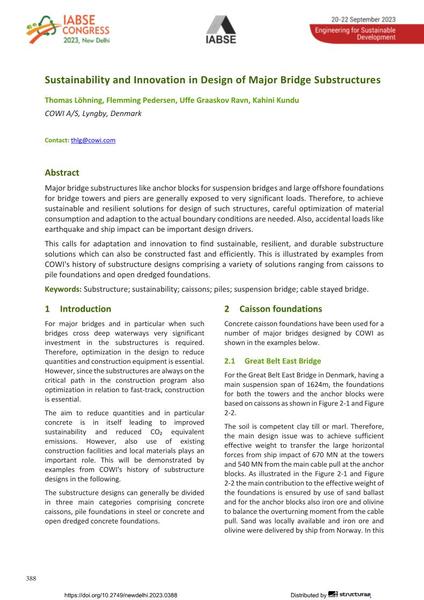Sustainability and Innovation in Design of Major Bridge Substructures

|
|
|||||||||||
Détails bibliographiques
| Auteur(s): |
Thomas Lehning
(COWi A/5, Lyngby, Denmark)
Flemming Pedersen (COWi A/5, Lyngby, Denmark) Uffe Graaskov Ravn (COWi A/5, Lyngby, Denmark) Kahini Kundu (COWi A/5, Lyngby, Denmark) |
||||
|---|---|---|---|---|---|
| Médium: | papier de conférence | ||||
| Langue(s): | anglais | ||||
| Conférence: | IABSE Congress: Engineering for Sustainable Development, New Delhi, India, 20-22 September 2023 | ||||
| Publié dans: | IABSE Congress New Delhi 2023 | ||||
|
|||||
| Page(s): | 388-395 | ||||
| Nombre total de pages (du PDF): | 8 | ||||
| DOI: | 10.2749/newdelhi.2023.0388 | ||||
| Abstrait: |
Major bridge substructures like anchor blocks for suspension bridges and large offshore foundations for bridge towers and piers are generally exposed to very significant loads. Therefore, to achieve sustainable and resilient solutions for design of such structures, careful optimization of material consumption and adaption to the actual boundary conditions are needed. Also, accidental loads like earthquake and ship impact can be important design drivers. This calls for adaptation and innovation to find sustainable, resilient, and durable substructure solutions which can also be constructed fast and efficiently. This is illustrated by examples from COWi's history of substructure designs comprising a variety of solutions ranging from caissons to pile foundations and open dredged foundations. |
||||
| Mots-clé: |
durabilité pont suspendu piles et culées
|
||||
